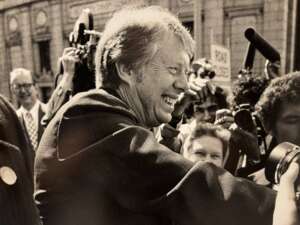Jimmy Carter, fire and the modern federal service
Jimmy Carter had a rocky presidency. Even his campaign sparked controversy. But he did sign into law a bill updating federal civil service after a century.
What a weird juxtaposition. On Wednesday, as Jimmy Carter’s state funeral service proceeded in Washington, wildfires in Los Angeles drove movie stars and cocktail waiters alike from their homes. Fire dogged the Carter presidency, too. A mishap during the mission to rescue the Iran hostages caused a fire that killed eight Delta Force service members and consumed two military aircraft.
Cable TV footage yesterday morning showed a man in LA aiming a pistol-style garden hose nozzle at a blaze that looks 10 feet tall. Futile. Operation Eagle Claw probably had a near zero chance of success, in retrospect.
It was highly complex as it depended on multiple variables and elaborate orchestration over great distances in dangerous terrain. It involved the Air Force, Army, Marines Corps and CIA, long before “joint” became the thing it is now. Military and political disaster ensued. I recall distinctly the sense of shame, rage and impotence that, at least briefly, swept the United States.
After years of “stagflation,” plus internecine White House and party battles, the failed rescue seemed to augur the landslide victory Ronald Reagan would achieve. Carter won only six states plus the District of Columbia.
I bought my first home, in a Braintree, Massachusetts, garden apartment complex converted to condos, in 1978, in the middle of the Carter presidency. It cost $31,500 and I felt lucky to nab a 10% mortgage. I still have the bread knife that somehow remained in a kitchen drawer after the last renters moved out and the renovation crews primped up the place.
Carter had ignited a brief firestorm during the campaign, thanks to an interview he gave to Playboy Magazine. In those days, Playboy was practically prudish by today’s standards. Barbershops would have copies available while you waited, the centerspreads removed, of course. In his interview, the evangelical Christian Carter stated he’d experienced “lust” and committed “adultery” — but only in his heart.
The incident seems humorous in retrospect. But wow, at the time, everybody talked about it. Yes, I was a Playboy subscriber at the time and made sure to read the interview. (That’s also where I first read John Updike, so there.) People wondered whether it meant Gerald Ford would win the 1976 presidential election.
The Carter years started with promise. I took this picture of a vibrant Jimmy in 1976. I was a photojournalism student at Rochester Institute of Technology, and the primary campaign brought Carter to Rochester, New York, one day. I remember him glaring at me in surprise. Standing right in front of his cab door as he emerged, I thought, “Who were you expecting, Jacob Javitz?” And I’ve waited 48 years for a chance to publish this picture!

Federal employees aspiring to the Senior Executive Service can thank Carter for signing the Civil Service Reform Act in 1978. My uncle was a high-level civilian in the Coast Guard at the time. I recall his explaining to the family what the new law meant. He was a member of the first cohort of SESers.
Today’s federal employment system may seem complex and slow. But the CSRA totally altered what had been in place in the late 19th century. Things moved fast, as outlined in this 1980 report from the GAO, then called the General Accounting Office. Then-Sen. Abraman Ribicoff (D-Conn.) sponsored it, but Carter had proposed comprehensive civil service reform in the first place. Carter was an efficiency enthusiast, and the purpose of the reform was to bring more of that characteristic to the federal government.
The Office of Personnel Management, Merit Systems Protection Board and the Federal Labor Relations Authority all came out of the CSRA. This may sound strange in the era of DOGE and Schedule F, but common wisdom at the time held that poor-performing federal employees were too difficult to fire. In this context, the old GAO report makes for worthwhile reading today.
The same issues occurred then as now: Difficulties in performance appraisals and ratings, flexibility in hiring procedures, an outmoded salary system were among the topics
GAO stated then: “Passage of the Civil Service Passage of the Civil Service Reform Act of
1978 marked a new era in the management of the federal workforce. The law is intended to provide Federal managers with the flexibility to improve Government operations and productivity while, at the same time, protect employees from unfair or unwarranted practices.”
It added, “The Congress did a commendable job in striking a balance between these objectives.” GAO went on to say that success would depend on how OPM went about its work, a job that continues to this day.
Carter, like any president, had much more to deal with than the federal workforce. But a signature during his one term set in place a surprisingly durable system.
Copyright © 2025 Federal News Network. All rights reserved. This website is not intended for users located within the European Economic Area.
Tom Temin is host of the Federal Drive and has been providing insight on federal technology and management issues for more than 30 years.
Follow @tteminWFED







